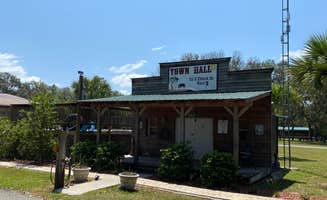Equestrian campgrounds near Orange Park, Florida offer access to diverse ecosystems including pine forests, wetlands, and freshwater waterways with elevations rarely exceeding 100 feet above sea level. Most horse-friendly campsites in this region feature sandy trails that remain passable year-round except during heavy summer rains when flooding may occur. Trail networks typically connect through conservation lands that protect native Florida habitats.
What to do
Wildlife observation opportunities: Bayard Conservation Area trails traverse shaded pine forests, hammocks, and river areas where campers can spot diverse wildlife. "On our way to our campsite we were able to spot many animals including: deer, otter, turkey, and wild pigs," reports camper Jenn B. The area offers primitive campsites with fire rings and picnic tables accessible via hiking trails.
Kayaking from waterfront sites: Princess Place Preserve - Moody Campground provides direct water access for paddling. "You will be able to open your tent flap door, take 10 paces and launch your kayak or canoe," notes Stuart K. The campground features only five sites total, most positioned directly on the waterfront with wooden framed tent pads.
Fishing opportunities: Several equestrian campsites provide access to productive fishing waters. The St. Johns River access points near horseback riding areas offer catfish and bass fishing. Pellicer Creek at Princess Place Preserve provides salt and freshwater fishing options. At Etoniah Creek State Forest, campers can access Georges Lake which has approximately 500 feet of lake frontage with designated fishing areas.
What campers like
Spacious, separated sites: Cary State Forest Campground receives high marks for its site layout. "Sites are spread out and HUGE!! Several trails and plenty of room for kids to play on site," writes David S. The park maintains only six RV sites total, providing exceptional privacy in a natural setting.
Clean facilities: Horse campers appreciate well-maintained shower and restroom facilities after trail rides. "The bathrooms at the equestrian site were recently repainted and looked acceptably clean. Not the best I've seen but the update now makes them much more user friendly and less grimy," notes B H. about Princess Place Preserve.
Peaceful atmosphere: Etoniah Creek State Forest offers tranquil camping experiences away from crowds. "Six Sites have picnic tables, lots of room, fire ring with grate, bbq grills, a latrine nearby," reports Brian K. The campground sits approximately four miles down bikeable hard roads from the main entrance, providing isolation.
What you should know
Water access limitations: Potable water availability varies significantly between horse camping facilities. "Keep in mind that there is no water available at the camping sites or the entire park for that matter. Potable or non potable so you have to bring in all drinking water," warns Louis B. about Princess Place Preserve. Several campgrounds offer only non-potable water supplies.
Wildlife encounters: Welaka State Forest and other equestrian campgrounds in the region require vigilance regarding native wildlife. "You'll want to be aware of alligators and snakes – and one big tip I have for keeping these reptiles at bay is keeping a fire going throughout the night," advises an experienced camper. Wild pigs may also damage trails in certain areas.
Seasonal considerations: Summer camping in horse facilities near Orange Park brings mosquitoes and biting flies. "Surprisingly, yellow flies are abundant," notes Chris S. about Cary State Forest. Most equestrian campgrounds have limited shade at corral areas, so horses may need additional protection during summer months when temperatures regularly exceed 90°F.
Tips for camping with families
Trail selection for children: Choose shorter loop trails when camping with younger riders. "We did the Hominy Trail which is 2.5 miles long and was well marked. There was gorgeous Live Oak trees with Spanish Moss hanging down, an adorable wild field full of white butterflies," shares Tina M. Family-friendly horse trails typically include interpretive signage identifying native plants.
Alternative activities: Connors Family Campsite offers options beyond horseback riding. "Host did the best he could to make a wonderful vacation for our family site is exactly as advertised if not better," reports Will C. Many equestrian campgrounds provide fishing access, playgrounds, or historical sites to explore when children need breaks from riding.
Firewood availability: Plan ahead for campfires at horse campgrounds. "Only problem we had is it was a little tough to find nice dry firewood. Most of the log sized potential firewood was pretty green, but there's plenty of tinder and kindling to make up for it," explains Nate D. Some sites prohibit gathering wood while others allow collection of fallen branches.
Tips from RVers
Power reliability concerns: Electric hookups at equestrian campgrounds may experience issues. "When we arrived and hooked up the 30amp breaker kept flipping. We had just left crooked river and hadn't had any issues," reports Hayley S. Bring surge protectors and be prepared for potential power limitations.
Site selection for horse trailers: Equestrian campgrounds require strategic parking for combined RV and horse trailer setups. "We got the only site that had electric and water on passenger side so we had to run electric under our rig. If we would have been in a class B or C you could go nose first," advises David S. Call ahead to confirm site configurations.
Surface conditions: RV campsites at horse facilities often have specific ground materials. "Note the roads are hard-pack and it is a Florida pine forest so it gets a bit muddy (and mosquito-y) on rainy days. Dump station is not fully paved so it too, gets muddy," warns J V. Some equestrian campgrounds feature concrete pads while others use crushed stone or compacted soil.



